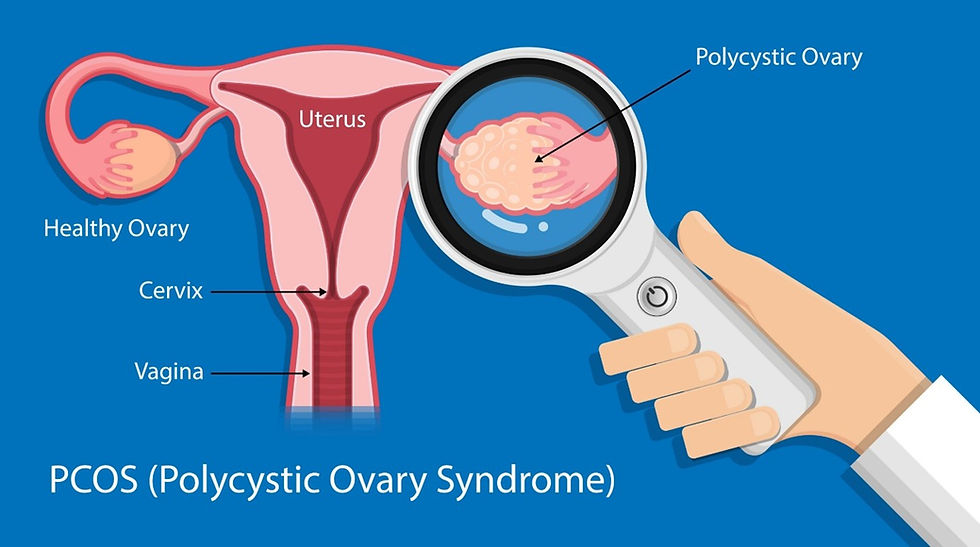Understanding PCOS
- Siphosami Ndala
- Sep 14, 2025
- 3 min read
What is PCOS?
PCOS, an acronym for Polycystic Ovary Syndrome, is a very common endocrine disorder affecting females from as early as puberty stages. It is simply an abnormal functioning of a number of hormones in the female body. There is an abnormal production of female hormones (estrogen and progesterone), which lead to multiple cyst formation in the ovaries, hence the name Polycystic Ovary Syndrome. PCOS also accounts for abnormally high levels of male hormones called androgens like testosterone, which could lead to hirsutism, which is an overgrowth of body hair on the chin, above the lips and sometimes excess hair on arms and legs. It is also associated with elevated insulin levels in the body due to insulin resistance. All these hormonal dysfunctions interfere with a woman’s menstrual cycle, causing irregular cycles and if not managed early, could lead to fertility difficulties.

Common symptoms of PCOS
· Irregular or missed periods
· Very oily skin (prone to acne)
· Weight gain
· Hair loss or hair thinning on scalp
· Excessive body hair growth (hirsutism)
· Multiple (poly)cysts in ovaries
· Poor or no ovulation
· Insulin resistance (elevated insulin levels)
· Difficulty in conceiving (infertility)
Diagnosing PCOS
- Physical exam and history taking of PCOS symptoms
- Blood tests to measure the different hormone levels
- Pelvic ultrasound to inspect for cysts in the ovaries

Complications of PCOS
1. Increased risk of Type 2 diabetes due to insulin resistance
2. Increased risk of cardiovascular conditions like raised blood pressure and high cholesterol levels
3. Increased risk of early miscarriage (especially in the first trimester) due to poor uterine implantation of the embryo
4. Increased risk of pregnancy complications like pregnancy-induced hypertension, pre-eclampsia and/or gestational diabetes
5. Increased risk of endometrial (uterine lining) cancer due to anovulation, which is the absence of ovulation
6. Increased risk of mental health issues like anxiety, mood disorders and depression which can be linked to the imbalance of hormones
Treating PCOS
Lifestyle changes: eating healthy and adopting an active lifestyle by regular exercising can help lower PCOS symptoms, in particular the control of weight gain and insulin regulation
Medication: birth control pills (oral contraceptives) are the most commonly used treatment options in treating PCOS and can assist the body to balance out its hormone production and resolve insulin resistance
Stress Management: with PCOS linked to mental health conditions, it is imperative that stress is well managed and controlled in order to alleviate mental complications
Medical consultation: seeking professional medical help is crucial when one has PCOS or symptoms thereof. Contacting your specialist gynecologist early can prevent later complications from arising.
Though there is no cure for PCOS, symptoms can be well managed as mentioned above. Early diagnosis is key.
References
Blake, T. (2015) Polycystic ovarian syndrome (PCOS). Available at: https://clicks.co.za/health/conditions/article-view/polycystic-ovarian-syndrome-pcos (Accessed on: 01/08/2025)
Felman, A. (2019) What to know about hirsutism. Available at: https://www.medicalnewstoday.com/articles/182659 (Accessed on: 01/08/2025)
Okell, A. (2023) PCOS 101 | A beginner’s guide to PCOS. Available at: https://pcoscollective.com/pcos-101/ (Accessed on: 01/08/2025)
PCOS Explained: Symptoms, Causes, and Treatment. (2025) Available at: https://biologyinsights.com/pcos-explained-symptoms-causes-and-treatment/ (Accessed on 01/08/2025)
Watson, S., Johnson, T.C. (2025) How PCOS May Increase the Risk of Endometrial Cancer. Available at: https://www.webmd.com/uterine-cancer/pcos-and-endometrial-cancer (Accessed on: 02/08/2025)
Palomba, S., Santagni, S., Falbo, A., La Sala, G.B. (2015) Complications and challenges associated with polycystic ovary syndrome: current perspectives, International Journal of Women’s Health. 7: pp. 745-763. doi: 10.2147/IJWH.S70314
Assessed and Endorsed by the MedReport Medical Review Board






